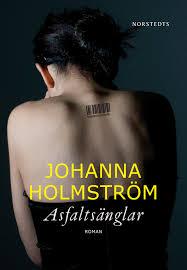
Asfaltsänglar
(Asphalt Angels)
by Johanna Holmström
reviewed by B J Epstein
You might think you’ve heard this story before: Teenage girls with a mixed-ethnicity background, where Muslim beliefs clash with modern Western culture and make them feel like outsiders. All this while, their sexuality is burgeoning. You can probably guess how such a story is going to end.
But lest you give up on Johanna Holmström’s Asfaltsänglar (Asphalt Angels) before even starting to read it, let me assure you that it is not quite what you expect.
Leila and Samira are sisters who are doubly on the outside. They grow up in Finland, but their mother is Finland-Swedish, while their father is an immigrant from the Maghreb region, so they feel un-Finnish for two reasons. The father, a bus driver, is not the religious Muslim one might have expected, while their mother, who is a convert, takes Islam much more seriously than her husband. ‘Haraam’ seems to be the word most connected to their mother; it means ‘sinful’ and refers to anything that Islam prohibits. To Leila and Samira, it often seems that both their lives are ruled by the concept of ‘haraam’.
The sisters want to create their own lives, but aren’t even clear about what this means, let alone how to go about doing it. Amidst their studies, their friendships, their beliefs and their parents’ strained relationships with their daughters and with one another, Leila and Samira try to find their own way. Samira experiments with escape but, when she does, Leila is left home alone, caught between worlds and caught between Mum and Dad.
Holmström’s novel is written in a poetical language, with some lovely turns of phrase that catch a reader’s attention. For example, an early description sets the scene: ‘Höst. Lönnar, rönnar och lögner i stilla brand och rimfrost i immiga band over gräsmattan om morgarna.’ This can be translated as: ‘Autumn. Maples, rowans and their lies, all are burning quietly, as misty ribbons of frost drift across the grass in the mornings.’ You immediately get a sense of the Finnish setting, and a hint of the family life within it.
Asfaltsänglar is told from multiple points of view, which enables readers to hear how the different protagonists experience their lives. There is often a wryness of tone, with subtly humorous comments, such as when the young women talk about putting on their ‘war paint’ to attract men, and refer to how unacceptable and ‘haraam’ their behaviour would be in their father’s native country.
This novel explores growing up and growing out of childhood certainties, but also the roads to growing into woman amidst the lying and the beauty.
A translated extract from the novel appears in the SBR special issue Cool Swedish Titles from Finland

Asfaltsänglar
Schildts & Söderströms, 2013. 293 pages.
